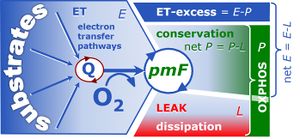Difference between revisions of "Coupling-control state"
| Line 1: | Line 1: | ||
{{MitoPedia | {{MitoPedia | ||
|abbr=''CCS'' | |abbr=''CCS'' | ||
|description='''Coupling control states''' are defined in [[mitochondrial preparations]] (isolated mitochondria, permeabilized cells, permeabilized tissues, homogenates) as [[LEAK]], [[OXPHOS]], and [[ETS]] states of respiration (''L, P, E'') in any [[ | |description='''Coupling control states''' are defined in [[mitochondrial preparations]] (isolated mitochondria, permeabilized cells, permeabilized tissues, homogenates) as [[LEAK]], [[OXPHOS]], and [[ETS]] states of respiration (''L, P, E'') in any [[pathway control state]] which is competent for electron transfer. These coupling states are induced by application of specific inhibitors of the [[phosphorylation system]], titration of ADP and uncouplers. In intact cells, the coupling control states are [[LEAK]], [[ROUTINE]], and [[ETS]] states of respiration (''L, R, E''). [[Coupling control protocol]]s induce these coupling control states sequentially at a constant [[pathway control state]]. | ||
|info=[[Gnaiger 2009 Int J Biochem Cell Biol]] | |info=[[Gnaiger 2009 Int J Biochem Cell Biol]] | ||
}} | }} | ||
| Line 10: | Line 10: | ||
|mitopedia method=Respirometry | |mitopedia method=Respirometry | ||
}} | }} | ||
[[File:EPL-free and excess.jpg|right|300px|thumb|[[Gnaiger 2014 MitoPathways |The Blue Book 2014: Fig. 2.4.]]]] | [[File:EPL-free and excess.jpg|right|300px|thumb|[[Gnaiger 2014 MitoPathways |The Blue Book 2014: Fig. 2.4.]]]] | ||
'''Coupling states:''' [[Image:P.jpg|link=OXPHOS capacity|OXPHOS]] [[Image:R.jpg|link=ROUTINE respiration|ROUTINE]] [[Image:E.jpg|link=ETS capacity|ETS]] [[Image:L.jpg|link=LEAK respiration|LEAK]] - [[Image:ROX.jpg|link=Residual oxygen consumption|ROX]] | '''Coupling states:''' [[Image:P.jpg|link=OXPHOS capacity|OXPHOS]] [[Image:R.jpg|link=ROUTINE respiration|ROUTINE]] [[Image:E.jpg|link=ETS capacity|ETS]] [[Image:L.jpg|link=LEAK respiration|LEAK]] - [[Image:ROX.jpg|link=Residual oxygen consumption|ROX]] | ||
Last edit: [[Gnaiger E]], 2015-10-04 | Last edit: [[Gnaiger E]], 2015-10-04 | ||
Revision as of 16:54, 26 August 2016
Description
Coupling control states are defined in mitochondrial preparations (isolated mitochondria, permeabilized cells, permeabilized tissues, homogenates) as LEAK, OXPHOS, and ETS states of respiration (L, P, E) in any pathway control state which is competent for electron transfer. These coupling states are induced by application of specific inhibitors of the phosphorylation system, titration of ADP and uncouplers. In intact cells, the coupling control states are LEAK, ROUTINE, and ETS states of respiration (L, R, E). Coupling control protocols induce these coupling control states sequentially at a constant pathway control state.
Abbreviation: CCS
Reference: Gnaiger 2009 Int J Biochem Cell Biol
MitoPedia concepts:
Respiratory state,
SUIT state
MitoPedia methods:
Respirometry
Last edit: Gnaiger E, 2015-10-04


